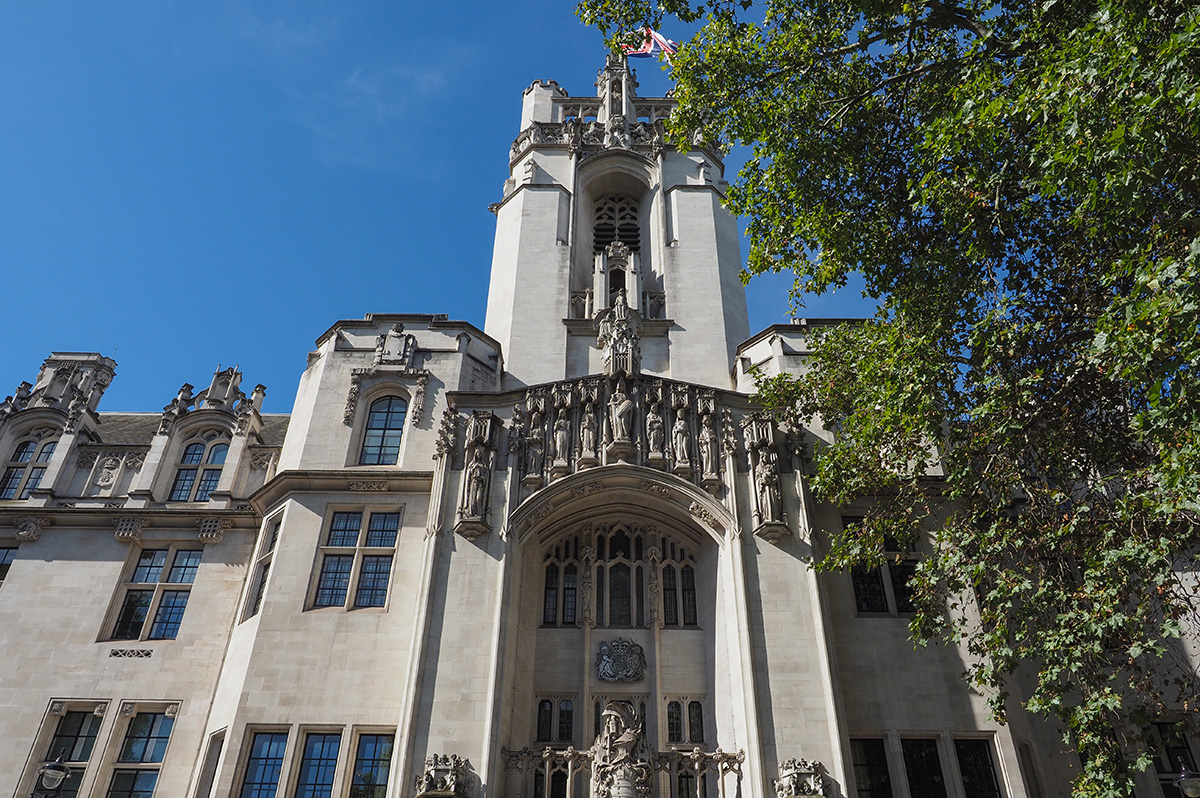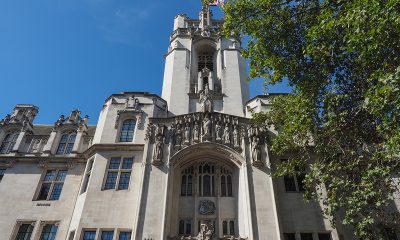News
Russian LGBT rights advocates visit D.C., Maine
Urge end to country’s anti-gay crackdown


Oleg Klyuenkov and Lyudmila Romodina of the Russian LGBT advocacy group Rakurs in D.C. on Nov. 8, 2013. (Washington Blade photo by Michael K. Lavers)
Two Russian LGBT rights advocates last week urged U.S. officials to continue to pressure the Kremlin to end its anti-gay crackdown.
Lyudmila Romodina and Oleg Klyuenkov of Rakurs (“Perspective” in Russian) in the city of Arkhangelsk met with U.S. Sen. Patty Murray (D-Wash.) and officials with the U.S. State Department, the White House and the Helsinki Commission in D.C. on Nov. 7. They also discussed Russia’s gay rights record Congressional LGBT Equality Caucus staffers on Capitol Hill on Nov. 8.
Romodina and Klyuenkov arrived in the U.S. on Nov. 1 — the same day the Olympic torch passed through Arkhangelsk on its way to the 2014 Winter Olympics that will take place in Sochi, Russia, in February.
Their trip began in Portland, Maine, where they met with the city’s mayor, Michael Brennan, members of a local PFLAG chapter, Equality Maine and other LGBT rights advocates and officials. The activists’ visit coincided with the 25th anniversary of the sister city partnership between Portland and Arkhangelsk.
Romodina and Klyuenkov returned to Russia on Nov. 10.
Human Rights First, a group that promotes international human rights, organized Romodina and Klyuenkov’s trip to the U.S.
“We’re trying to use [Russian] American partnerships in a constructive way; to take the partnership to a new level of dialogue where human rights and LGBT rights are present at the table, they’re discussed,” Innokenty Grekov of Human Rights First told the Washington Blade during an interview in Northwest Washington on Nov. 8.
Arkhangelsk law was ‘test pilot’ for national gay propaganda ban
Rakurs, which is a member of the Russian LGBT Network, is the first group that specifically works with Arkhangelsk’s LGBT residents.
The group was a feminist organization when it was founded in 2007. Russia’s Justice Ministry in 2010 denied Rakurs’ request to add the words lesbian, gay, bisexual and transgender to their charter and by-laws.
A regional court later ordered the Justice Ministry to allow Rakurs to register as an LGBT rights organization.
“It took some time,” Klyuenkov told the Blade through an interpreter.
Arkhangelsk officials in 2011 banned propaganda that promotes homosexuality and bisexuality. They quietly repealed the law last month, but Klyuenkov told the Blade the Arkhangelsk statute was a “test pilot” for the nationwide ban on gay propaganda to minors that Russian President Vladimir Putin signed in June.
“The informational campaign that surrounded the regional ban in Arkhangelsk was a miniature version of the mass media campaign that surrounded the adoption of the federal ban,” Klyuenkov said. “It was quite aggressive as we were just slandered and slimed. We were accused of undermining demography of Russia, undermining traditional values, being a threat to traditional values.”
Rakurs distributed leaflets that contained information on what Klyuenkov described as the “dangers of adopting a federal law on propaganda.” The organization also sought a permit to stage a protest against the measure as members of the Russian Duma debated it, but Romodina told the Blade that Arkhangelsk officials used the regional gay propaganda ban to deny their request.
“When we received these denials for demonstrations involving multiple individuals, we went and nevertheless demonstrated in single pickets,” she said.
Lawmakers criticize IOC during advocates’ trip
Romodina and Klyuenkov’s trip to the U.S. coincided with the growing outrage over the Kremlin’s LGBT rights record that threatens to overshadow the Sochi games.
U.S. Sens. Barbara Boxer (D-Calif.), Christopher Murphy (D-Conn.), Jeff Merkley (D-Ore.), Dick Durbin (D-Ill.), Jeanne Shaheen (D-N.H.), Sheldon Whitehouse (D-R.I.), Claire McCaskill (D-Mo.), Al Franken (D-Minn.), Elizabeth Warren (D-Mass.), Christopher Coons (D-Del.) and Mark Udall (D-Colo.) in a Nov. 8 letter criticized International Olympic Committee President Thomas Bach over his previous comments that appeared to suggest he feels Russia’s gay propaganda ban does not violate the Olympic Charter.
Bach said in September before the lighting of the Olympic torch in Greece that Olympic values include “respect without any form of discrimination.” Putin on Oct. 28 reiterated previous Russian government claims that gays and lesbians will not suffer discrimination during the Sochi games.
“Although some Russian authorities have indicated that the law will not affect Olympic spectators and participants, we have yet to see a satisfactory explanation of what type of activities or behavior will be permitted,” the U.S. senators wrote in their letter. “If LGBT individuals or supporters were to be arrested or harassed during the Olympics, the reputation of the IOC would be damaged.”
U.S. Rep. Ileana Ros-Lehtinen (R-Fla.) and more than three dozen other members of Congress last month urged U.S. Olympic Committee President Scott Blackmun to outline steps the USOC plans to take to safeguard American athletes who plan to compete in Sochi.
Blackmun on Oct. 11 described Russia’s gay propaganda ban is “inconsistent with the fundamental principles of the Olympic and Paraolympic movements.” The U.S. Olympic Committee Board of Directors the day before voted to add sexual orientation to its non-discrimination policy.
Advocates oppose Olympic boycott
Romodina and Klyuenkov are the latest Russian LGBT rights advocates to visit the U.S.
Igor Kochetkov of the Russian LGBT rights group Sphere is among those who met with Ros-Lehtinen on Capitol Hill in September. He was part of the group of human rights activists who met with President Obama during the G-20 summit in St. Petersburg a few weeks earlier.
Russian LGBT Sports Federation Co-President Elvina Yuvakaeva was part of a five-member delegation whom the State Department invited to the U.S. in September to meet with professional American sports team and organizers of the 1996 Summer Olympics in Atlanta and the 2002 Winter Olympics in Salt Lake City.
Klyuenkov told the Blade he feels “interest groups” within the Russian government have “persuaded” Putin to sign the gay propaganda law and other anti-LGBT measures. These include a 2012 statute that requires groups that receive funding from outside the country to register as “foreign agents.”
“This federal law on propaganda is part of a larger, broader policy,” Klyuenkov said. “The government is simply trying to distract the public’s attention from our societal problems, our economic problems.”
Klyuenkov and Rodomina both stressed their organization remains opposed to any boycott of the Sochi games over Russia’s LGBT rights record.
“We should use both the Olympic games and the existing relationships between our municipal entities as a platform for discussing human rights, for encouraging more dialogue within Russia between the government and civil society and LGBT groups,” Klyuenkov said.
The advocates spoke with the Blade a day before gay MSNBC anchor Thomas Roberts co-hosted the Miss Universe pageant in Moscow.
Roberts repeatedly criticized the gay propaganda law during interviews with the “Today” show and other media outlets in the days leading up to the pageant that Donald Trump co-owns with NBC Universal. Pageant participants did not discuss Russia’s LGBT rights record during the event.
“It’s great,” Klyuenkov told the Blade when asked about Roberts co-hosting the pageant. “I don’t think the Russian people watch Miss Universe.”
Elton John is scheduled to perform two concerts in Russia next month amid controversy from some LGBT rights advocates.
“His approach is to go over and engage and win over,” Grekov told the Blade. “Rakurs is doing the same. Human Rights First is so happy to help facilitate this visit and raise their voice.”
U.S. Military/Pentagon
Pentagon urged to reverse Naval Academy book ban
Hundreds of titles discussing race, gender, and sexuality pulled from library shelves

Lambda Legal and the Legal Defense Fund issued a letter on Tuesday urging U.S. Defense Secretary Pete Hegseth to reverse course on a policy that led to the removal of 381 books from the Nimitz Library of the U.S. Naval Academy in Annapolis, Md.
Pursuant to President Donald Trump’s executive order 14190, “Ending Radical Indoctrination in K-12 Schooling,” the institution screened 900 titles to identify works promoting “diversity, equity, and inclusion,” removing those that concerned or touched upon “topics pertaining to the experiences of people of color, especially Black people, and/or LGBTQ people,” according to a press release from the civil rights organizations.
These included “I Know Why the Caged Bird Sings” by Maya Angelou, “Stone Fruit” by Lee Lai, “The Hate U Give” by Angie Thomas, “Lies My Teacher Told Me: Everything Your American History Textbook Got Wrong” by James W. Loewen, “Gender Queer: A Memoir” by Maia Kobabe, and “Democracy in Black: How Race Still Enslaves the American Soul” by Eddie S. Glaude, Jr.
The groups further noted that “the collection retained other books with messages and themes that privilege certain races and religions over others, including ‘The Clansman: A Historical Romance of the Ku Klux Klan’ by Thomas Dixon, Jr., ‘Mein Kampf’ by Adolf Hitler, and ‘Heart of Darkness’ by Joseph Conrad.
In their letter, Lambda Legal and LDF argued the books must be returned to circulation to preserve the “constitutional rights” of cadets at the institution, warning of the “danger” that comes with “censoring materials based on viewpoints disfavored by the current administration.”
“Such censorship is especially dangerous in an educational setting, where critical inquiry, intellectual diversity, and exposure to a wide array of perspectives are necessary to educate future citizen-leaders,” Lambda Legal Chief Legal Officer Jennifer C. Pizer and LDF Director of Strategic Initiatives Jin Hee Lee said in the press release.
Federal Government
White House sues Maine for refusing to comply with trans athlete ban
Lawsuit follows months-long conflict over school sports in state

The Justice Department is suing the state of Maine for refusing to comply with President Donald Trump’s executive order banning transgender athletes from participating in school sports, U.S. Attorney General Pam Bondi announced on Wednesday.
DOJ’s lawsuit accuses the state of violating Title IX rules barring sex discrimination, arguing that girls and women are disadvantaged in sports and deprived of opportunities like scholarships when they must compete against natal males, an interpretation of the statute that reverses course from how the law was enforced under the Biden-Harris administration.
“We tried to get Maine to comply” before filing the complaint, Bondi said during a news conference. She added the department is asking the court to “have the titles return to the young women who rightfully won these sports” and may also retroactively pull federal funding to the state for refusing to comply with the ban in the past.
Earlier this year, the attorney general sent letters to Maine, California, and Minnesota warning the blue states that the department “does not tolerate state officials who ignore federal law.”
According to the Maine Principals’ Association, only two trans high school-aged girls are competing statewide this year. Conclusions from research on the athletic performance of trans athletes vis-a-vis their cisgender counterparts have been mixed.
Trump critics and LGBTQ advocates maintain that efforts to enforce the ban can facilitate invasive gender policing to settle questions about an individual athlete’s birth sex, which puts all girls and women at risk. Others believe determinations about eligibility should be made not by the federal government but by school districts, states, and athletics associations.
Bondi’s announcement marked the latest escalation of a months-long feud between Trump and Maine, which began in February when the state’s Democratic governor, Janet Mills, declined to say she would enforce the ban.
Also on Wednesday, U.S. Education Secretary Linda McMahon said the findings from her department’s Title IX investigation into Maine schools — which, likewise, concerned their inclusion of trans student-athletes in competitive sports — was referred to DOJ.
Earlier this month, the Justice Department pulled $1.5 million in grants for Maine’s Department of Corrections because a trans woman was placed in a women’s correctional facility in violation of a different anti-trans executive order, while the U.S. Department of Agriculture paused the disbursement of funds supporting education programs in the state over its failure to comply with Title IX rules.
A federal court last week ordered USDA to unfreeze the money in a ruling that prohibits the agency from “terminating, freezing, or otherwise interfering with the state’s access to federal funds based on alleged Title IX violations without following the process required by federal statute.”
United Kingdom
UK Supreme Court rules legal definition of woman limited to ‘biological women’
Advocacy groups say decision is serious setback for transgender rights

The British Supreme Court on Wednesday ruled the legal definition of a woman is limited to “biological women” and does not include transgender women.
The Equality Act that bans discrimination based on sexual orientation and gender identity took effect in 2010.
Scottish MPs in 2018 passed a bill that sought to increase the number of women on government boards. The Supreme Court ruling notes For Women Scotland — a “feminist voluntary organization which campaigns to strengthen women’s rights and children’s rights in Scotland” — challenged the Scottish government’s decision to include trans women with a Gender Recognition Certificate in its definition of women when it implemented the quota.
Stonewall U.K., a British advocacy group, notes a Gender Recognition Certificate is “a document that allows some trans men and trans women to have the right gender on their birth certificate.”
“We conclude that the guidance issued by the Scottish government is incorrect,” reads the Supreme Court ruling. “A person with a GRC (Gender Recognition Certificate) in the female gender does not come within the definition of ‘woman’ for the purposes of sex discrimination in section 11 of the EA (Equality Act) 2010. That in turn means that the definition of ‘woman’ in section 2 of the 2018 Act, which Scottish ministers accept must bear the same meaning as the term ‘woman’ in section 11 and section 212 of the EA 2010, is limited to biological women and does not include trans women with a GRC.”
The 88-page ruling says trans people “are protected by the indirect discrimination provisions” of the Equality Act, regardless of whether they have a Gender Recognition Certificate.
“Transgender people are also protected from indirect discrimination where they are put at a particular disadvantage which they share with members of their biological sex,” it adds.
Susan Smith, co-founder of For Women Scotland, praised the decision.
“Today the judges have said what we always believed to be the case, that women are protected by their biological sex,” she said, according to the BBC. “Sex is real and women can now feel safe that services and spaces designated for women are for women and we are enormously grateful to the Supreme Court for this ruling.”
Author J.K. Rowling on X said it “took three extraordinary, tenacious Scottish women with an army behind them to get this case heard by the Supreme Court.”
“In winning, they’ve protected the rights of women and girls across the UK,” she added.
It took three extraordinary, tenacious Scottish women with an army behind them to get this case heard by the Supreme Court and, in winning, they’ve protected the rights of women and girls across the UK. @ForWomenScot, I’m so proud to know you 🏴💜🏴💚🏴🤍🏴 https://t.co/JEvcScVVGS
— J.K. Rowling (@jk_rowling) April 16, 2025
Advocacy groups in Scotland and across the U.K. said the ruling is a serious setback for trans rights.
“We are really shocked by today’s Supreme Court decision — which reverses 20 years of understanding on how the law recognizes trans men and women with Gender Recognition Certificates,” said Scottish Trans and the Equality Network in a statement posted to Instagram. “The judgment seems to have totally missed what matters to trans people — that we are able to live our lives, and be recognized, in line with who we truly are.”
Consortium, a network of more than 700 LGBTQ and intersex rights groups from across the U.K., in their own statement said it is “deeply concerned at the widespread, harmful implications of today’s Supreme Court ruling.”
“As LGBT+ organizations across the country, we stand in solidarity with trans, intersex and nonbinary folk as we navigate from here,” said Consortium.
The Supreme Court said its decision can be appealed.
-

 The White House5 days ago
The White House5 days agoWhite House does not ‘respond’ to reporters’ requests with pronouns included
-

 District of Columbia2 days ago
District of Columbia2 days agoReenactment of 1965 gay rights protest at White House set for April 17
-

 Hungary2 days ago
Hungary2 days agoHungarian MPs amend constitution to ban public LGBTQ events
-

 Maryland2 days ago
Maryland2 days agoFreeState Justice: Transgender activist ‘hijacked’ Moore’s Transgender Day of Visibility event











